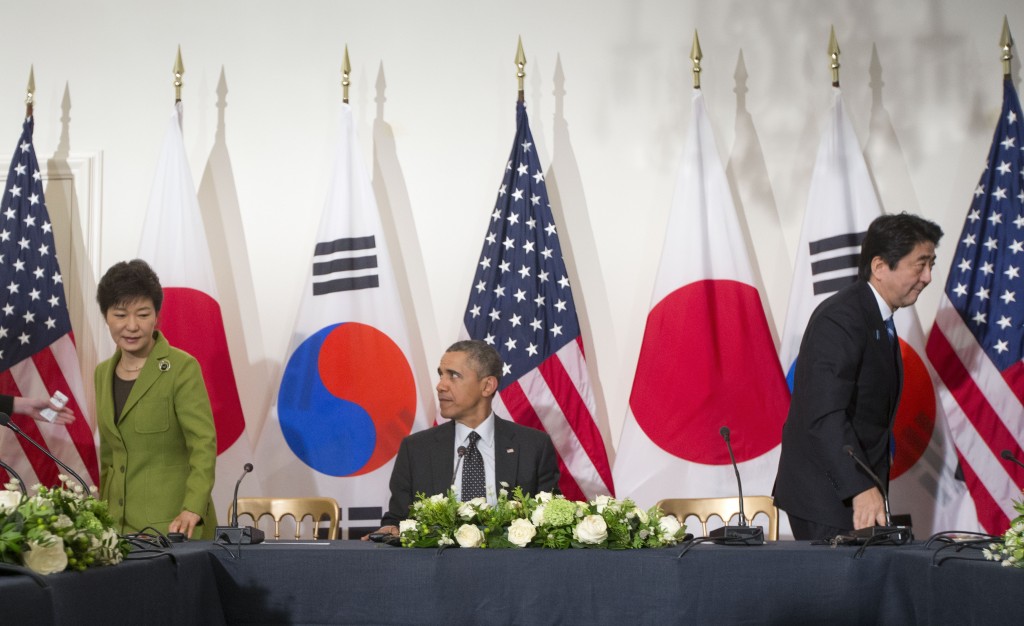- California Assembly OKs highest minimum wage in nation
- S. Korea unveils first graphic cigarette warnings
- US joins with South Korea, Japan in bid to deter North Korea
- LPGA golfer Chun In-gee finally back in action
- S. Korea won’t be top seed in final World Cup qualification round
- US men’s soccer misses 2nd straight Olympics
- US back on track in qualifying with 4-0 win over Guatemala
- High-intensity workout injuries spawn cottage industry
- CDC expands range of Zika mosquitoes into parts of Northeast
- Who knew? ‘The Walking Dead’ is helping families connect
Abe invited to address US Congress

President Barack Obama watches as South Korean President Park Geun-hye, left, and Japanese Prime Minister Shinzo Abe, leave their seats at the opposite ends of the table, Tuesday, March 25, 2014, during the start of their trilateral meeting at the US Ambassador’s Residence in the Hague, Netherlands. (AP Photo/Pablo Martinez Monsivais)
By Chang Jae-soon
WASHINGTON, March 26 (Yonhap) — U.S. House Speaker John Boehner on Thursday announced his invitation for Japanese Prime Minister Shinzo Abe to speak at a joint meeting of Congress next month, saying he is “proud to host this historic event.”
The April 29 speech will make Abe the first Japanese prime minister to address a joint session of Congress.
“As the United States continues to strengthen our ties with Japan, we look forward to welcoming Prime Minister Abe to the United States Capitol. His address will provide an opportunity for the American people to hear from one of our closest allies about ways we can expand our cooperation on economic and security priorities,” Boehner said in a statement.
“That, of course, includes working together to open markets and encourage more economic growth through free trade. Prime Minister Abe will become the first Japanese leader to address a joint meeting of the United States Congress, and we are proud to host this historic event,” he said.
Abe’s trip to the U.S., set for April 26-May 2, includes summit talks with President Barack Obama on April 28 and is expected to be an occasion for the two countries to celebrate their ever-growing security and economic partnerships.
White House officials have repeatedly said they would welcome Abe in grand fashion as with a state visit, even though he is not a head of state. That reflects the high expectations the U.S. places on Abe.
Abe’s visit will be “a celebration of the strong partnership that the United States and Japan have developed since the end of the Second World War, and to underscore the common values and principles have made this relationship so enduring,” State Department spokesperson Jeff Rathke said.
U.S. officials hope to see a breakthrough in trade negotiations during Abe’s visit. If concluded, the massive Trans Pacific Partnership would represent an unmistakable achievement as Obama struggles to leave a legacy before his second term ends in two years.
Japan has also been a key security partner for the U.S. in a region where China has significantly increased its influence. Washington and Tokyo have been negotiating to revise their bilateral defense cooperation guidelines in a way that increases Japan’s military role through “collective self-defense.”
Collective self-defense empowers Japan to fight alongside its allies even when not under attack itself. Japan’s Cabinet reinterpreted Tokyo’s war-renouncing constitution to make it possible for the country to exercise the right. The revision is also seen as an effort to keep a rising China in check.
On Thursday, Sen. John McCain, chairman of the Senate Armed Services Committee, praised Abe, saying Japan now has a “stable government with a strong leader” for the first time in a long time.
“I’m a great admirer of Mr. Abe,” he said at an event organized by the Center for Strategic and International Studies. “I’m very happy with our strategic partnership. Our military relationship is excellent.”
McCain also called for improved ties between South Korea and Japan.
“It grieves all of us who are friends with Japan and Korea that there can’t be some rapprochement and settlement. Look, they’re our two strongest allies in Asia,” he said, calling for resolving the row between Seoul and Tokyo over Japan’s wartime sexual enslavement.
“Every time I meet one of them, I beg them to sit down and get this resolved,” he said. “If you believe that there is a looming threat of Chinese assertiveness, than it is in everybody’s interest to see Japan and Korea working closely together.”
Former Japanese Prime Minister Junichiro Koizumi had pushed for a congressional address in 2000, but it did not happen due to objections from the then House Foreign Affairs Committee chairman over Koizumi’s visits to a Tokyo shrine honoring war dead, including war criminals.
Critics have claimed that Abe is not worthy of the honor because he has attempted to whitewash Japan’s militaristic past and wartime atrocities, especially the country’s sexual enslavement of women for its troops during World War II.
Korean-American organizations have campaigned against such an address by Abe and collected about 6,000 signatures so far. They also ran a full-page advertisement in the newspaper The Hill demanding Abe apologize for the sexual slavery issue before speaking before Congress.

















Pingback: Shinzo Abe Invited to Speak Before Joint U.S. Congress Session | KoreAm Journal - Korean America's Premier Magazine
Pingback: Shinzo Abe Invited to Address Joint U.S. Congress Session | KoreAm Journal - Korean America's Premier Magazine
Pingback: China Policy Institute Blog » Don’t Blame Abe…Help Him!
Lovetraction Lines
October 9, 2017 at 7:35 AM
i was just browsing along and came upon your blog. just wanted to say good blog and this article really helped me.